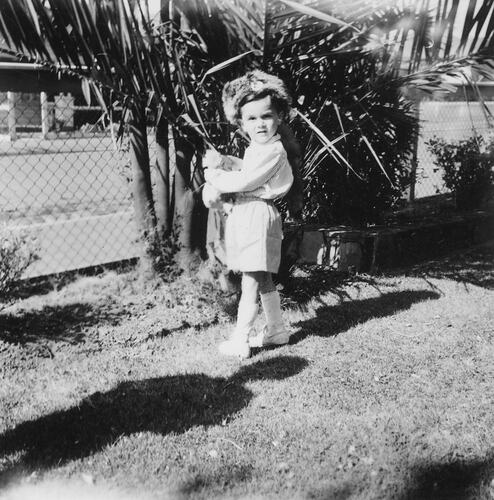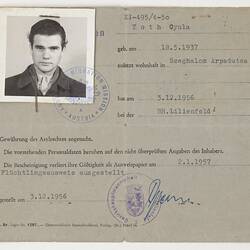Summary
Black and white digital photograph of Peter Schmideg holding a toy koala and wearing a Davy Crockett fur cap, both items he received from a Jewish community welfare association upon his arrival from Hungary at Station Pier, Port Melbourne with his family in January 1957.
Peter was originally offered a block of Cadbury chocolate along with the other younger children but complained so bitterly when he saw the girls receiving toy koalas he secured one for himself (also in the Museum's collection). The cap was placed on his brother Stephen's head and he had no idea what it was. The cap originally had a Davy Crockett badge pinned at the front.
Stephen and Peter Schmideg fled Budapest with their parents Zoltan and Margit after the Soviet repression of the Hungarian revolution in 1956. Zoltan and Margit had already survived appalling experiences and loss of family as Jews during World War II. They managed to escape to Austria, before being processed and joining their ship the Aurelia in Genoa, before finally arriving in Melbourne on 28 January 1957.
Description of Content
Boy wearing white shirt, shorts, long socks and shoes and a fur cap with a tail and holding a toy koala. Standing in a garden setting.
Physical Description
Black and white digital photograph.
Significance
Statement of Historical Significance:
This collection of objects and photographs provides a rare opportunity to document the experiences of migrant children, both at point of arrival in Australia and subsequent settlement. The toys represent the interweaving of both Australian and American popular culture in the 1950s, on the cusp of the launch of television in Australia, as well as the increasing popularity of Australian native symbols to represent an Australian identity. The photos of the children at play with the items is a rare opportunity to document the objects in use at the time. They also demonstrate the role of some community groups (in this case Jewish) in greeting newly arrived migrants and the recognition of the special attention children might require, particularly after traumatic experiences in countries of origin.
More Information
-
Collecting Areas
Migration & Cultural Diversity, Childhood, Images & Image Making, Leisure
-
Person Depicted
Mr Peter Schmideg, Thornbury, Victoria, Australia, circa 1957
-
Format
Digital file, Black & White
-
Classification
Migration, Settlement - first home & family, Child portraits
-
Category
-
Discipline
-
Type of item
-
Keywords
Hungarian Immigration, Hungarian Communities, Children, Childhood, Identifications, Photography, Television Publicity, Toys

